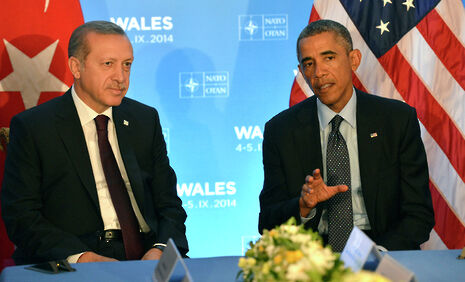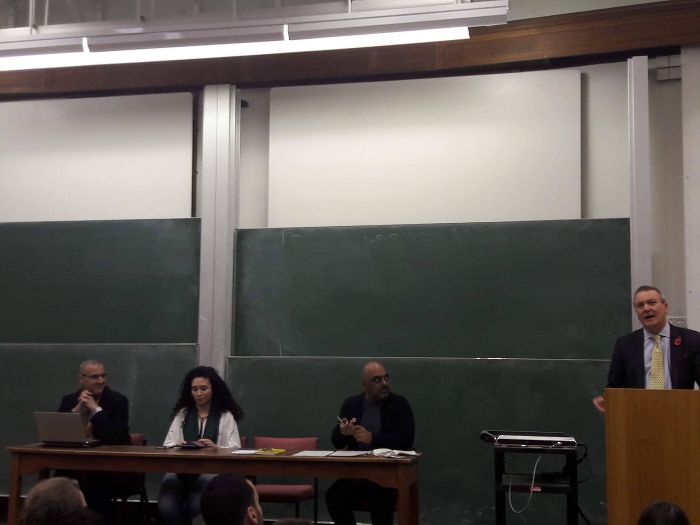MENAF panel discuss the turbulent future of Turkey
Hosted by the Cambridge Middle East and North Africa Forum, the panel discussed the future of Turkey after the failed coup attempt of July 2016

On Monday evening, a panel hosted by the Cambridge Middle East and North Africa Forum (MENAF) discussed the troubled political situation developing in Turkey over the last ten years.
The panel discussion, entitled ‘After July 15: The Future of Turkey’ and held at Gonville & Caius College, primarily focused on the trend towards nationalism and Islamism following an attempted coup by a faction of the Turkish armed forces in summer 2016.
The panel consisted of Jonathan Friedman, who has worked as a financial consultant for Turkish investors and is currently director of digital risk management firm Stroz Friedberg; Dasha Afanasieva, the former Istanbul correspondent for Reuters, and Cambridge’s own Dr Ayse Zarakol, a fellow of Emmanuel College and a reader in International Relations.
The first part of the evening consisted of panellists giving their thoughts on the state of Turkey today, and how it arrived in its precarious international and domestic position. Friedman was keen to emphasise the “structural factors in Turkey” which led to the current situation, pointing out how Turkey’s role in Western foreign policy has shifted from being “a key part of containment policy against the Soviet Union” to their current position - questioning “old alliances” in the United States, the EU and the West and acting more autonomously.
Dasha Afanasieva, on the other hand, was keen to bring her experiences of living in Turkey to the discussion, giving her account of the “rise of nationalism” she witnessed after the coup attempt, partially because of the perception of “outside agents controlling” Turkey. Her perception of the question facing the government boiled down to “secularism vs. Islamism and ‘how do you reconcile the two?’”.
Dr Zarakol differed somewhat from the other two panellists in her assessment, saying that they had found “too much method in the madness of Turkish politics”. She doubted that any “grand vision” of “moving away from the West” existed given the erratic alliances and enemies which Turkey has been making. Rather, she saw the situation as more chaotic, arguing that the government had needed to “manufacture enemies” in order to maintain legitimacy and coherence.
New issues were raised when the audience was given a chance to pose questions to the panel. The panel reached something of a consensus on the relationship between Kurds in Turkey and the government, with Dasha Afanasieva saying that in the government’s view, Turkey has a “PKK [the main Kurdish insurgent group] problem, not a Kurdish problem”. Jonathan Friedman and Dr Zarakol suggested that there was no consistent position from all Kurds towards the government or vice versa.
However, when asked whether Turkey’s foreign policy could be seen as aligning with Qatar and Iran, the panel were in disagreement again. Dr Zarakol branded all of Turkey’s new alliances a collective “marriage of convenience”, while Jonathan Friedman pointed out that there is a court case in the US alleging that a Turkish state bank [executive] conspired with Iran to launder money, and that there may be credit from other Arab states keeping the Turkish economy afloat.
The evening concluded with discussion of President Erdoğan’s electoral future, with the panel speculating that given Turkey’s highly nationalistic climate, he could be threatened by a resurgent Nationalist Movement Party, the main far-right and ultranationalist party in Turkey
 News / Uni Scout and Guide Club affirms trans inclusion 12 December 2025
News / Uni Scout and Guide Club affirms trans inclusion 12 December 2025 News / Pembroke to convert listed office building into accom9 December 2025
News / Pembroke to convert listed office building into accom9 December 2025 News / Cambridge Vet School gets lifeline year to stay accredited28 November 2025
News / Cambridge Vet School gets lifeline year to stay accredited28 November 2025 Features / Searching for community in queer Cambridge10 December 2025
Features / Searching for community in queer Cambridge10 December 2025 News / Uni redundancy consultation ‘falls short of legal duties’, unions say6 December 2025
News / Uni redundancy consultation ‘falls short of legal duties’, unions say6 December 2025









